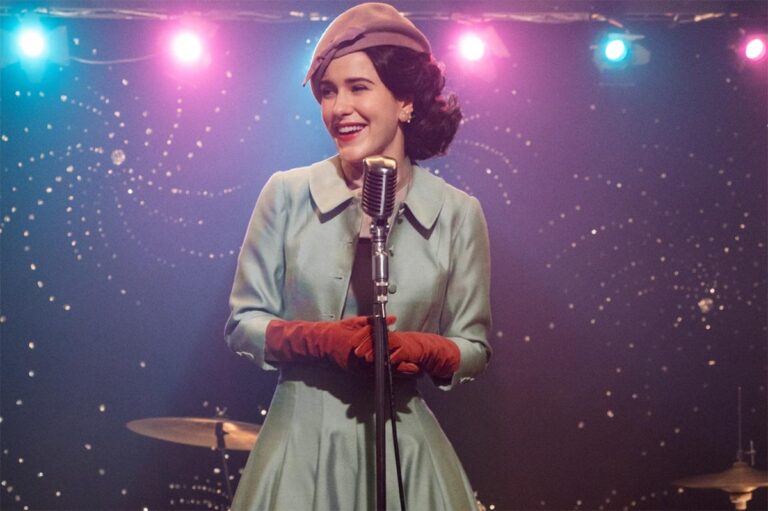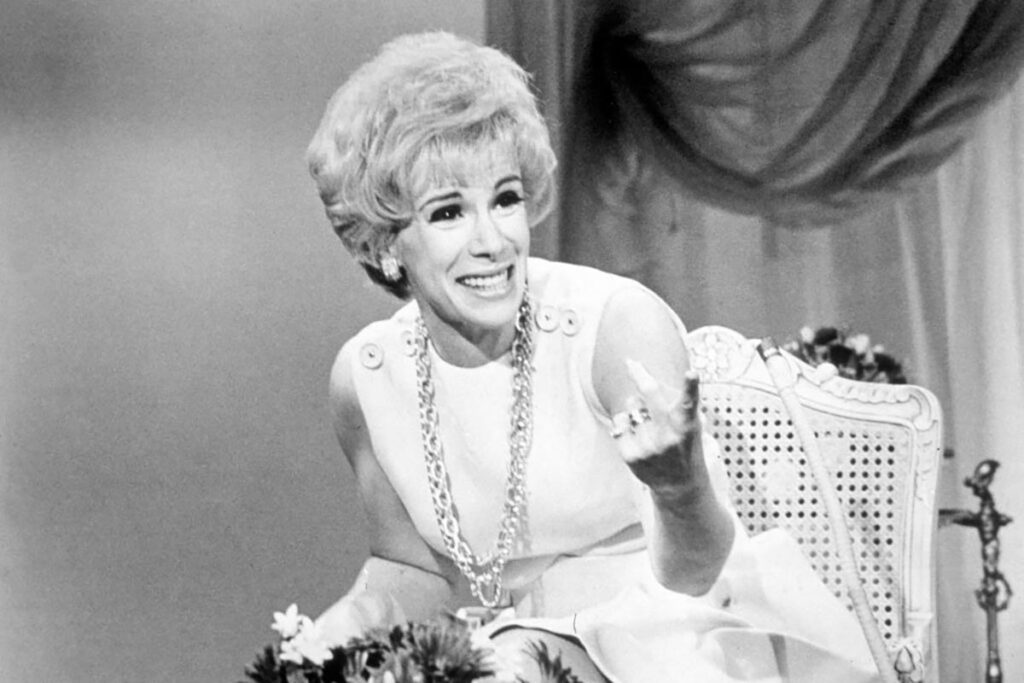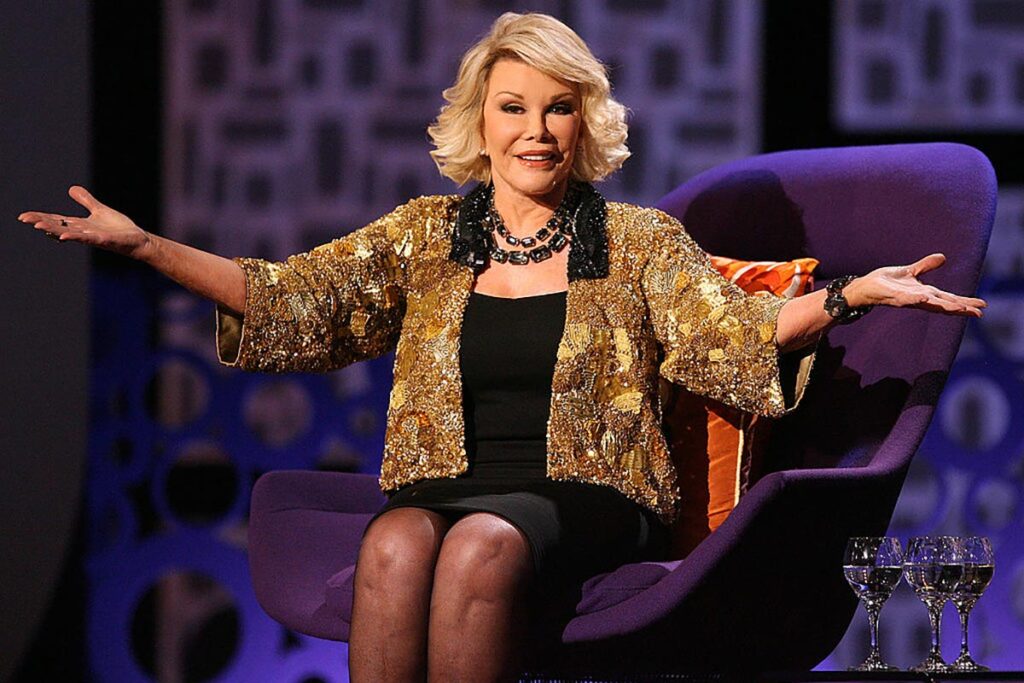
Earlier this year, viewers bid farewell to Amy Sherman-Palladino’s beloved hit series, “The Marvelous Mrs. Maisel.”
Taking place in the 1950s and 60s, the series follows aspiring comic Midge Maisel, captivating audiences with its elaborate vintage costumes, hilarious side characters, and some of the most unforgettable Jewish portrayals in modern television.
While “The Marvelous Mrs. Maisel” is indeed a work of fiction, did you know its lead character drew significant inspiration from a real-life Jewish comedian?
Joan Rivers, known for her unmistakable New York accent, raspy voice, and sharp observational humor, navigated the turbulent world of stand-up comedy at a time when it was uncommon for women to work outside of the home.
Throughout her illustrious career, Rivers, who passed away in 2014, overcame numerous obstacles to become one of America’s most iconic comedians.
Amy Sherman-Palladino, the creator of “Mrs. Maisel,” revealed in a 2017 Vanity Fair interview that Midge’s comedy routines reflected Rivers’:
“[Joan Rivers] had that wonderful mix, that battle of wanting to be accepted on a feminine level — [but] you can’t have that many balls and be accepted on a feminine level,” she said. “…It was such a wonderful dichotomy, and she crafted those monster jokes.”
Indeed, Rivers’ groundbreaking comedy and fearless persona inspired a generation of comedians, including Sarah Silverman, Whoopi Goldberg, David Letterman and Conan O’Brien.
Joan Rivers: The real-life inspiration for Midge Maisel

Yet, Rivers’ comedic style was not without controversy. Her bold, often abrasive humor was a defining characteristic of her act, but it also led to many controversies throughout her career.
She was unapologetic about her penchant for controversial jokes, often saying that laughter was a way to deal with pain. Her outspokenness and refusal to censor her jokes about sensitive topics sometimes drew criticism and backlash.
However, it was these very qualities that made her a revolutionary figure in comedy, paving the way for a new generation of comedians who challenged societal norms and expectations.
As a pioneering female comic, Rivers led a fascinating and trailblazing career. Let’s explore her remarkable life story and how it draws parallels to the marvelous Midge Maisel.
Rivers was born in NYC to Jewish parents
Both Rivers and her fictional counterpart share a hometown: New York City. While Midge’s character hails from an affluent Upper West Side neighborhood, Rivers was a native of Brooklyn.
Born in 1933 as Joan Alexandra Molinsky, Rivers was the daughter of Russian-Jewish immigrant parents. She made her stage debut at the Adelphi Academy of Brooklyn, even serving as president of her school’s Dramatic Club at the age of 16.
Rivers attended a women’s liberal arts college
Both women attended women’s liberal arts colleges. Midge studied at Bryn Mawr College just outside Philadelphia, while Rivers graduated from Barnard College in 1954 with a degree in English literature and anthropology.
In Rivers’ honor, Barnard has established the Joan Rivers Trailblazer Award, which is given “to someone who exemplifies strength, determination, creativity and courage that were hallmarks of the legendary comedian.”
Joan Rivers embraced her Jewish identity
Rivers was a proud Jew, telling Tablet Magazine that she loved Jewish tradition.
“I love going to temple — I love Rosh Hashanah, Yom Kippur, Hanukkah…On Passover, I look forward to doing my meal.” Rivers also attributed her own sense of resilience to her Jewish background, saying: “It’s all about survival. My husband’s entire family was killed in the Holocaust…so I’m not here to fall apart.”
In her comedy routines and writings, she frequently explored themes of Jewish identity and culture, such as spending summers in the Catskills (where she performed early in her career) and feeling left out during Christmas.
Rivers performed at Gaslight Cafe in Greenwich Village
Midge frequently performs at the Gaslight Cafe, a real venue in Greenwich Village famous for hosting several music and comedy acts from the counterculture era, or the underground cultural movements of the early 1960s’ which pushed the boundaries of free speech and artistic expression. (Midge’s father even participates on the show). Some of the real-life performers include Bob Dylan, Jimi Hendrix, and a budding Joan Rivers.
Rivers performed at several comedy clubs during the early 1960s and was associated with many big names at the time, including Woody Allen and George Carlin.
Rivers was friends with Lenny Bruce
A notable mutual friend Joan Rivers and Midge would have had in common was legendary Jewish comedian Lenny Bruce. Unlike on the show, Bruce and Rivers were not intimately involved, but the “godfather of standup” was a huge inspiration for her.
According to Rivers, one night, after watching her bomb at a club, Lenny Bruce left her a note saying “You’re right, they’re wrong.” Rivers was honored that he thought she had talent, and she kept that note all her life.
It was not long after this that Rivers had her big breakthrough on “The Tonight Show,” becoming a familiar face to viewers across America, much like Midge’s own rise in the television world, first as a writer and then finally getting to perform on camera.
Rivers had a penchant for style
Throughout her career, Rivers proved that she was just as savvy about the latest trends as she was about comedy.
From teased hair in the 60s to power suits in the 80s, to bright colors and fur coats in the 2000s, Rivers’ outfits became a symbol of her larger-than-life persona.
As her career evolved, Joan Rivers became a regular presence at red-carpet events, where she interviewed celebrities about their fashion choices.
In fact, Rivers is often credited with popularizing the now-common red-carpet question, “Who are you wearing?”
Rivers gained a reputation for her forthright and often blunt commentary on these outfits. Her critiques, while sometimes harsh, were eagerly anticipated and became a signature aspect of her red-carpet coverage.
Rivers revealed personal details in her stand-up routines

Rivers once said: “Never be afraid to laugh at yourself. After all, you could be missing out on the joke of the century.” She certainly followed her own advice.
Writing in The Hollywood Reporter, Rivers explained: “The white men were doing ‘mother-in-law’ and “my wife’s so fat …’ jokes. It was all interchangeable. Bob Hope would walk into a town and say, ‘The traffic lights in this town are so slow that …’ and it could be any town. When I went onstage, that just didn’t feel right. So I just said, ‘Let me talk about my life.’”
Rivers’ early sets often focused on self-deprecating jokes about her looks, childhood, and her own failed marriage. In one routine, Rivers shared how her mother, who lost everything when she immigrated, was constantly worried about money, and her own experiences with financial insecurity. On her doctor father, Rivers quipped: “My mother wanted M.D. to stand for ‘Make Dollars.’”
As she grew more famous, Rivers displayed a keen, albeit harsh, awareness of herself. After her death in 2014, Rivers left behind an astounding collection of over 65,000 jokes, typed out on cards and cross-indexed, and categorized. Some of these categories include “parents hate me” and “no sex appeal.”
Over time, Rivers became known for her catchphrase, “Can we talk?” which would often be followed by a seemingly mundane yet personal subject she would hilariously break down (“Can we talk about cleaning?” “Can we talk about marriage?” “Can we talk about hot flashes?”)
Rivers faced an uphill battle to cement her legacy
Unfortunately, some of the men whom she considered her colleagues and mentors never had her best interests at heart. Most notably, Rivers had an infamous falling out with the late comedian Johnny Carson, a man Rivers had once viewed as a mentor.
Rivers always had a sense that Carson never saw her as competition or as a potential successor, a belief that seemed to be confirmed in the 1980s. When a list of potential replacements for Carson surfaced, Rivers was noticeably absent.
Strongly suspecting that misogyny had played a part in the decision, Rivers was deeply hurt. She later expressed her feelings, writing: “I think he really felt because I was a woman that I just was his….For years, I thought that maybe he liked me better than the others. But I think it was a question of, ‘I found you, and you’re my property.’…”
Frustrated, Rivers, who was Carson’s permanent guest host, sought new opportunities and landed her own talk show on FOX, which was seen as a direct competition to Carson’s show. According to Rivers, when Carson found out, he was hurt and felt blindsided because he heard about it from FOX’s announcement rather than from Rivers herself.
He also made it clear that any guest who appeared on Rivers’ show wouldn’t be welcomed on his, which caused Rivers’s ratings to quickly decline. Further complicating the matter, Carson also severed all ties with her and banned her from “The Tonight Show.”
That ban lasted from 1986 to 2014. Even when Jay Leno took over “The Tonight Show” in 1992, he maintained the ban out of respect for Carson, despite personally admiring Rivers. Speaking to Access Hollywood, Leno acknowledged the awkwardness of the situation, saying: “I don’t think he wanted to see her on the show and that’s why we didn’t do it.” He also recalled, “[Joan Rivers] was the first autograph I ever got… and we were friends…”
It wasn’t until 2014, when Jimmy Fallon took over, that Rivers finally returned to the “Tonight Show,” marking the end of a nearly three-decade-long ban.
Rivers turned to comedy in professional and personal tragedies
Like Midge Maisel, the character she influenced, Joan Rivers channeled personal adversity into humor. Rivers faced a series of personal and professional tragedies in the late 1980s: she lost her longtime mentor and friend, Johnny Carson, her talk show was canceled, and her husband Edgar Rosenberg tragically died by suicide.
These setbacks left Rivers in a difficult place. She later reflected, “Everything just went to smithereens.” Despite these challenges, Rivers found solace in her craft and even returned to television by 1989 with a daytime talk show.
Displaying the resilience that marked both her career and personal life, she famously stated: “There are many self-help books by Ph.D.s, but I hold a different degree: an I.B.T.I.A.—I’ve Been Through It All.”
In keeping with her unique approach to comedy, Rivers openly discussed her life, transforming her personal grief into daring jokes. “My husband wanted to be cremated. I told him I’d scatter his ashes at Neiman Marcus — that way, I’d visit him every day,” she once quipped.
Rivers’ resilience and ability to find humor in the face of adversity left an enduring impact on her audience. Her passion for comedy was on display in a 2011 episode of “Louie,” where she stated, “…You want a real job, honey? There are a million things you can do, but what we do is not a job. What we do is a calling, we make people happy.”
Joan Rivers’ enduring influence goes beyond Midge Maisel and “The Marvelous Mrs. Maisel.” Her audacious humor, refusal to bow to societal norms, and ability to spin personal adversity into comedic gold continue to inspire countless comedians today.
Her words underscore the tradition that Jewish comedians will continue to carry forward, one marked by humor, resilience, and the power to make people happy, for as long as there are stages and microphones waiting for them.
What are your thoughts on Joan Rivers’ influence on Midge Maisel and comedy in general? Let us know on Instagram, Twitter, and TikTok!
Originally Published Jul 2, 2023 10:18PM EDT


